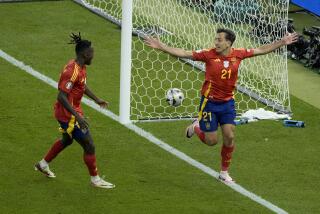Past won’t affect present
- Share via
It’s easy for soccer-loving Germany to remember its last European Championship title. The image of Juergen Klinsman trotting up the Wembley Stadium steps in London to collect the trophy from Britain’s Queen Elizabeth II is only 12 years old.
For Spain, things are somewhat more difficult.
The Beatles were just hitting their stride in 1964 the last time the Spanish won the continent’s most prized national team tournament.
Today, when the two countries meet in the 13th final, in rain-threatened Vienna, the outcome is anyone’s guess.
Germany began the 16-nation event three weeks ago as the favorite and has compiled a 4-1 record in reaching the final. Coach Joachim “Jogi” Loew’s team has outscored its opponents 10-6.
Spain is 4-0-1 and, surprising even itself, has been made the favorite to end its 44-year barren spell in major tournaments even though it is up against a three-time winner. It has scored 11 goals and given up three.
But history will not decide the outcome. The game could be won or lost on a flash of brilliance from Spanish striker Fernando Torres, a momentary lapse by German goalkeeper Jens Lehmann, a mistake by Spanish defender Carles Puyol or another stupendous goal by German midfielder Lukas Podolski.
Both teams have star quality and are drawn from Europe’s top club teams.
Of the 22 probable starters, four are from German champion Bayern Munich, three from Spanish champion Real Madrid, three from Barcelona, with Arsenal, Liverpool and perhaps Chelsea also represented.
One star is definitely out for Spain, and another is very questionable for Germany.
Striker David Villa will not play after suffering a thigh strain in the semifinals. Spain Coach Luis Aragones is likely to start Arsenal midfielder Cesc Fabregas in his place, leaving Torres as the lone forward, but he was uncertain Saturday.
“We might have less attacking punch, but we will have more control in the midfield,” he said. “I haven’t decided anything yet, though, and I might still play two strikers.”
For Germany, Chelsea midfielder Michael Ballack was trying to overcome a calf strain.
“Our medical team will be working with him ‘round the clock, but we have to think seriously about alternatives,” Loew said.
At its most basic level, the game pits German strength, determination and an aerial game against Spanish flair, creativity and a possession game, a point well made by Aragones.
“They’re taller and stronger dealing with high balls,” he said. “That’s where we’re going to suffer a bit. Perhaps I should buy a ladder for my players. I’m sure, though, that Germany is concerned that the football we play on the ground will create problems for them too.”
Said German defender Cristoph Metzelder: “Spain is the only team in the tournament that has played with consistency. They have very good ball control, great precision in passing. But you need special qualities in a final and we have them.”
The last time Spain reached the final, in 1984, it lost to a France team led by Michel Platini, now the president of UEFA, European soccer’s governing body.
“I was thinking while I was shaving this morning about how I took the trophy off the Spanish 24 years ago but could be handing it back to them tomorrow,” Platini said.
--
More to Read
Go beyond the scoreboard
Get the latest on L.A.'s teams in the daily Sports Report newsletter.
You may occasionally receive promotional content from the Los Angeles Times.






